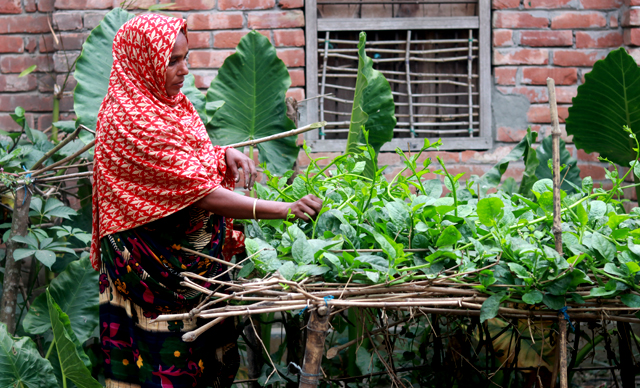
RAJSHAHI, March 20, 2024 (BSS) – Nearly 3,500 underprivileged families having around 14,000 populations became self-reliant taking new own methods and ideas like poultry rearing and farming to earn the money in the region.
They took different initiatives to overcome their long-lasting extreme poverty using their natural resources.
Reshma Begum, 30, wife of Abdur Rouf of Parmohanghosh village under Atrai Upazila in Naogaon district, was provided an asset valuing Taka 21,000.
But, around four years back, she had lost most of her belongings in a devastating flood. The financial support by a project and her relentless efforts contributed a lot to reviving their livelihood from a worst situation.
Panna Begum, 40, is rearing nine sheep and seven hens and ducks valued at Taka 24,700 enabling her painstaking efforts to improve their living and livelihood condition.
She is happy with her income-generating activities saying her level of confidence has enhanced to a greater extent.
Begum, wife of Dulal Hossain in Chalk Boloram village under Raninagar Upazila under the same district, received two sheep, one hen and other rearing accessories worth Taka 9,000 from a recently phased-out anti-poverty project in 2019.
A total of 1,600 families in 43 villages under the two flood-affected upazilas received productive resources worth Taka 9,000 each under the ‘Strengthening of resilience and adaptability to climate change in north Bangladesh (REAP) Project’.
In 2020, five consecutive floods drove people of the two upazilas into a state of despair.
The beneficiaries invested the capital in various income generating activities creating diversified, climate-resilient and disaster-proof earning opportunities.
Anwara Begum, 50, of Paikara village in Atrai Upazila, said her low lying fields and crops were badly damaged by floodwater in 2020.
So the following year, she raised the level of her cultivated land to mitigate the effect of the floodwater. She also uses organic fertilizer to reduce production costs besides protecting the environment.
DASCOH Foundation, Pollisree and NETZ Partnership for Development and Justice, Bangladesh jointly implemented the REAP Project in Rani Nagar and Atrai Upazilas in Naogaon and Dimla and Domar Upazilas in Nilphamari districts since January, 2019.
In the four upazilas, 3,500 families were brought under diversified income-generating activities to strengthen their economic and social resilience and adaptability to climate-related risks and natural disasters.
All the project participants were imparted training on climate smart agriculture and climate-resilient income generating activities so that they can earn properly.
Ultimate goal of the project was to overcome extreme poverty (SDG 1) and to reduce the vulnerability to the adverse consequences of climate change (SDG 13).
As a whole, the project has been implemented to enable the beneficiaries through effective preparedness measures and adaptation strategies so that they can jointly address the consequences of climate change at local level.
“We provide a range of training and supply productive assets to the beneficiaries since their joining to the project,” said Joyanti Rani, Technical Officer of Pollisree, adding they are being taught on how to cultivate vegetables in their homestead.
They were also habituated to cultivating vegetables in a bucket or a plastic bag.
In this method, families can keep their vegetable plants inside their homes or take them to the safe, higher ground dam when they have to leave their houses during the rainy season.
Muhammad Moniruzzaman, Programme Manager of NETZ, said the beneficiaries are taking self-help initiatives to tackle the impact of climate change. The training courses have enhanced their capabilities and opportunities to pursue climate-resilient farming.
The women and their families have started numerous income-generating activities, he added.
In particular, the farmers who have no land and are socially and economically disadvantaged often face great challenges to adapt to the effects of the climate crisis that have been brought under the project, said Akramul Haque, Chief Executive Officer of DASCOH Foundation.